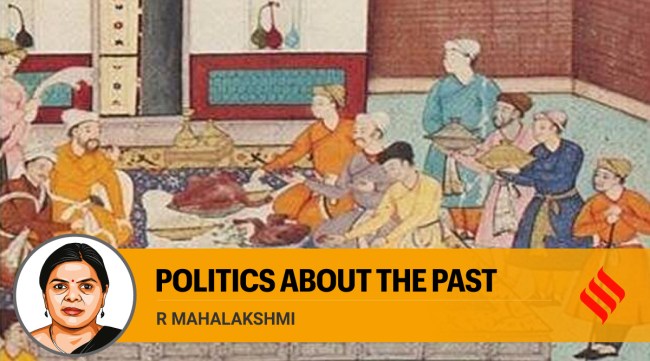Opinion History textbook deletions: Why NCERT argument that it is trying to reduce pressure on students is weak
Changes in textbooks have to be based on rigorous research. Currently, they appear to be targeting certain periods of Indian history. They also do not indicate an appreciation of developments in world history
 Even a cursory look at the chapters deleted shows that they bring a different level of knowledge and understanding to the students, even if the broad period or theme was covered in early years, in different textbooks. (Wikimedia Commons)
Even a cursory look at the chapters deleted shows that they bring a different level of knowledge and understanding to the students, even if the broad period or theme was covered in early years, in different textbooks. (Wikimedia Commons) The excuse that the NCERT has given for the so-called rationalisation of content — the Covid-19 pandemic and the resultant pressure on students — is no longer relevant. Then why go ahead with the axing of chapters or parts of chapters? The answer lies in the specifics of what has been removed from the textbooks, and quite obviously, the history textbooks provide the best example. Many of us had raised a red flag last year when the issue came to light. It was also pointed out by educationists that piecemeal rationalisation is actually detrimental to the overall knowledge being imparted to students. This year, according to the NCERT Director Dinesh Prasad Saklani, chapters on the Mughals have not been dropped, and it is a lie to talk of these deletions. He reportedly said that “expert committees examined the books from standards 6-12”. Contradicting his earlier point, he states, “They recommended that if this chapter is dropped, it won’t affect the knowledge of the children and an unnecessary burden can be removed…The debate is unnecessary.” Quite clearly, there is no lie involved in the reporting of the deletions and equally clearly, there is an obfuscation of the facts regarding deletions.
The rationale for the dropping of the various chapters is the recommendation of an expert committee on the grounds that these deletions would not affect the knowledge of children and an unnecessary burden would be removed. The chapters concerned, as reported, are as follows: from Class 11, the book, Themes in World History, ‘Central Islamic Lands’ (Theme 4), ‘Confrontation of Cultures’ (Theme 8), and ‘The Industrial Revolution’ (Theme 9); from the Class 12 book, Themes of Indian History-Part II, ‘Kings and Chronicles’; the ‘Mughal Courts’ (C. 16th and 17th centuries) (Theme 9). One of the arguments posited is also that these have been covered in earlier years.
Even a cursory look at the chapters deleted shows that they bring a different level of knowledge and understanding to the students, even if the broad period or theme was covered in early years, in different textbooks. And anyway, going by this rationalisation, chapters on Harappa or other aspects could very easily have been dropped. That they were not, indicates that it is not a simple case of reducing the load. This is also a spurious argument because the level of discussion varies in textbooks for different classes, and to not discuss the development of the state in ancient India or the anti-colonial freedom struggles in India because this may have been covered earlier doesn’t make sense. By that standard, courses at the Masters level in universities would be shorn of much of their content as students may have covered themes/topics in their under-graduation!
Let us look at the chapter on the ‘Confrontation of Cultures’ that has been deleted from the Class 11 history textbook. There is almost nothing here that has been covered previously. The chapter looks at the European presence in the Americas, and the nature of the confrontation, contestation and assimilation that occurred as a result. From the small subsistence economies in the Caribbean and in Brazil, to the large state societies in Central America and Peru, this chapter overturns the Eurocentric understanding of mercantile expansion, conquest of resource-rich regions, religious encounters and transformations, and the rise of capitalism at a later stage. Linked to this is the chapter on the Industrial Revolution. There is a reversal of the gaze from the conventional Eurocentric narratives of progress and achievement alone, with the changes and transformation of society and economy through inventions, discoveries, the harnessing of resources on an unprecedented scale, and the rise of the factory system and a modern workforce that lived in squalor, the growth of a small and affluent section of industrialists etc. being some of the issues covered here. This is a dense chapter and does raise the bar as far as knowledge is concerned, all the more so because these themes have not been touched upon earlier in this sustained manner. Again, how the axing of this can be rationalised is curious. Both these chapters are in fact crucial for our understanding of colonialism and capitalism in the early modern world, which had ramifications in the Indian context.
It is the deletion from the Class 12 history book that is the most striking, because most of the chapter — except for the first one-and-a-half pages which provide a sketch of the rulers of the Mughal dynasty — presents fresh material and perspectives on how to understand the developments that took place during this period. How does a state project itself? The Turko-Afghan rulers brought in the tradition of chronicling, in a sustained manner, into the subcontinent. Other than a limited description of rulers and their achievements in the Sangam Tamil text Padirruppattu (c. 2nd-3rd century CE), or in the masterly Rajatarangini by Kalhana (12th century), the chronicle as a mode of historical narration is available to us in India with the establishment of the Delhi Sultanate. The use of court language, the creation of an archive — the kitabkhana, the production of manuscripts in karkhanas/workshops — these are some of the fascinating issues that are brought to the attention of students. Of course, chronicling also meant information generation. So, there is discussion in a nuanced way of the nature of information on the empire. This may have been covered earlier in snippets; what we have here is an interweaving of the production of information with a content analysis that has not been done in earlier classes.
It would be specious to make a case for never bringing in changes in textbooks. That cannot be, as with time, new research may throw up interesting sources or interpretations of periods, institutions, rulers and the common people. But these have to be based on rigorous research, and it cannot be argued, as some have, that ideological orientation will decide what should be taught as history. In that vein, it appears that the arguments proffered for the deletions of chapters in history textbooks are at best weak, and at worst untenable as they appear to be particularly targeting certain periods of Indian history, and also do not indicate an appreciation of developments in world history.
The writer is professor, Centre for Historical Studies, Jawaharlal Nehru University


